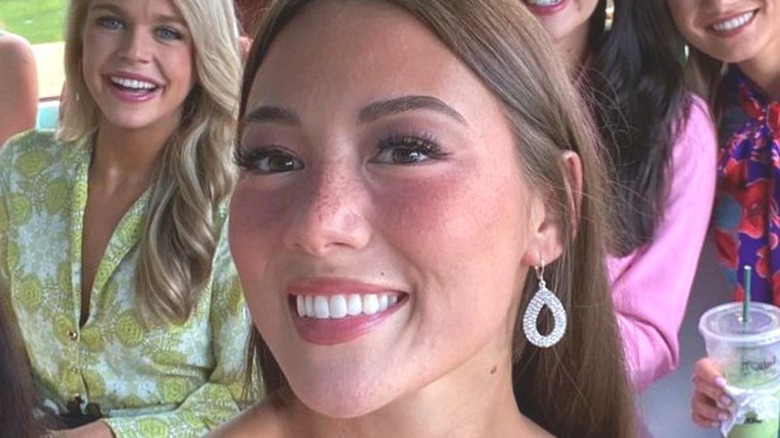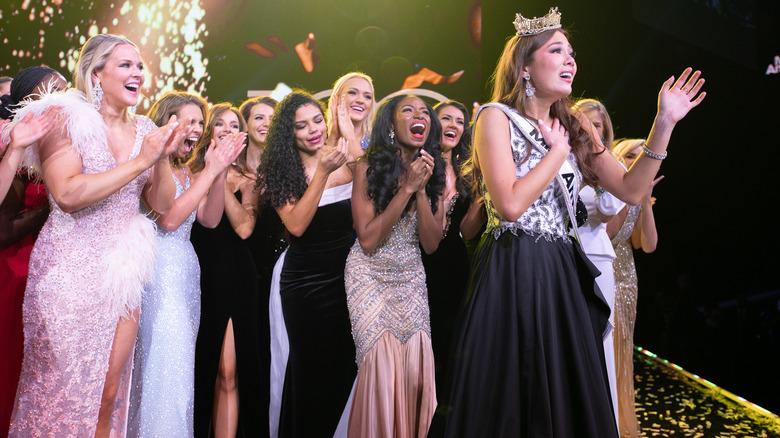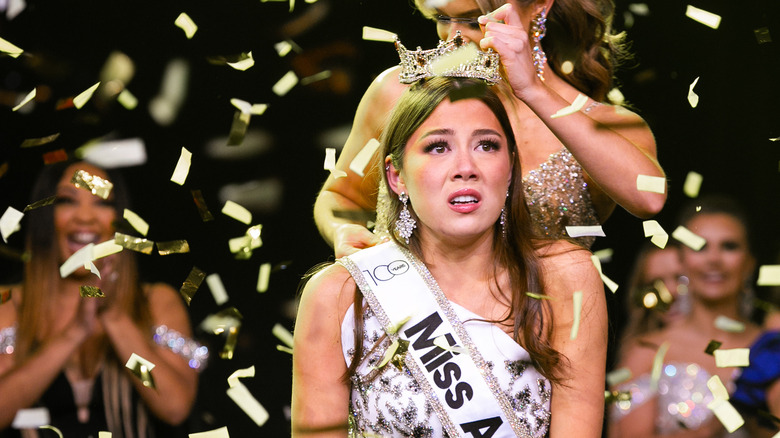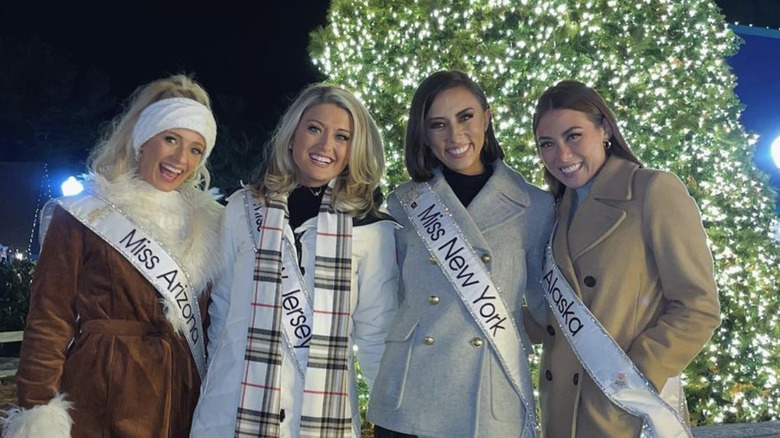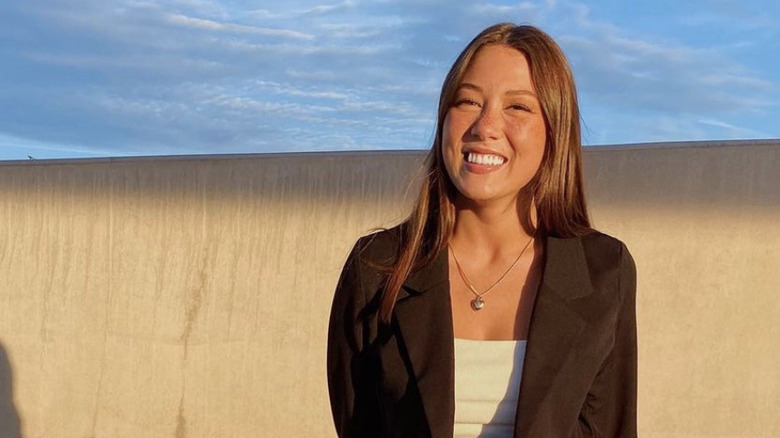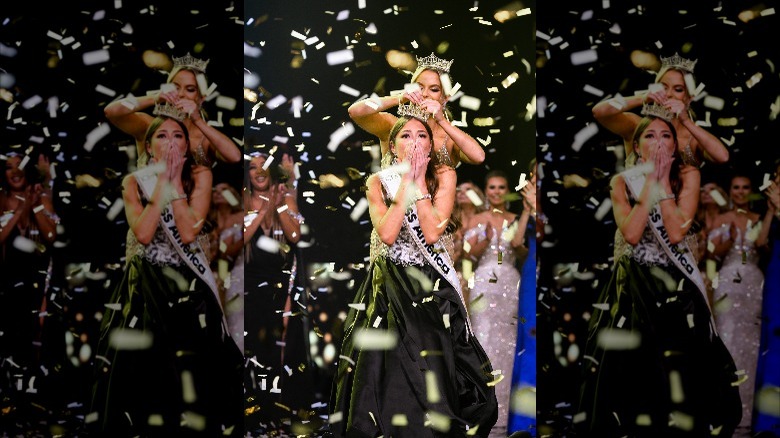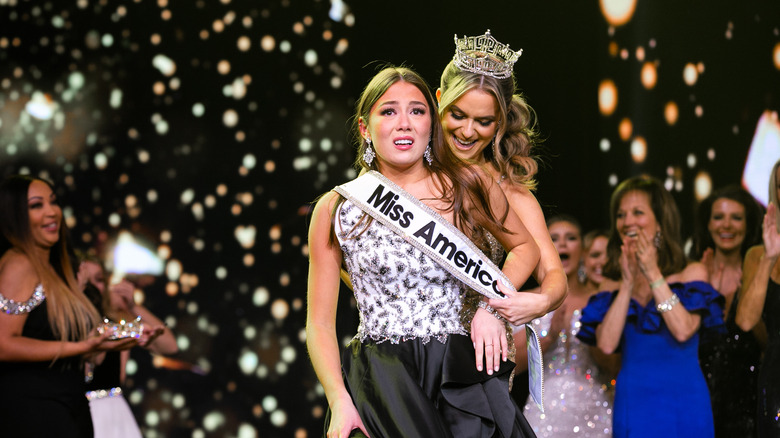Miss America Emma Broyles Opens Up About ADHD, Inclusion, & More - Exclusive Interview
On December 16, Emma Broyles was crowned Miss America 2022. It was a particularly momentous occasion as it marked the 100th Anniversary of the Miss America competition! Notably, she's also the first representative from her home state of Alaska and the first Korean American to win the title (via NPR). Along with the crown, Broyles received $100,000 in scholarship money, which she plans to use for medical school. With the goal of becoming a dermatologist, she's currently attending Barrett, The Honors College at Arizona State University, majoring in biomedical science. Clearly, she's been busy!
We were lucky enough to catch up with Broyles after her big win, and in an exclusive interview with The List, she discussed how she's hoping to use her platform for good and why she thinks it's important to showcase her authentic self rather than being put on a "pedestal." That's why, throughout the competition, she was transparent about her life and her experience with ADHD and dermatillomania. She hopes that by continuing to speak openly about some of the low points she's experienced, she can show people that it's possible to come out of them stronger than ever!
How it felt to win Miss America
So, how did it feel the moment you realized you'd won Miss America?
It was so surreal. I mean, I truly believe that any of those women up on the stage with me could have made an incredible Miss America and have already made such significant impacts in their communities and could have done the same nationwide. But I just felt so honored that I have the opportunity to represent my class and especially honored that I'm the first Miss Alaska to make it this far and to be able to represent my state and the nation as Miss America.
And to be the first Korean American as a Miss America. That was a really special moment for me, and I think it's really representative of the change that we've seen in this program. And I was thinking about how $100,000 is a life-changing amount of money and how now I can pay for medical school, and I'm not going to have to worry about that. So it was an incredible moment, surreal. It still hasn't set in. It's not going to set for a while. I'm just so grateful for so many reasons and thankful for everybody who's been there with me along the way.
Yeah, absolutely. And like you said, you're the first representative from Alaska to win. You're also the first Korean American. What are you hoping viewers who maybe are growing up in Alaska or are Korean American get from your representation?
Yeah. I think one of the most important things to me when I look at a Miss America is this aspect of relatability. I think that people tend to put Miss America on this pedestal. They say, "Wow, she's earning all this money and college scholarships, and she's on TV, and she's wearing this sparkly hat, and she's doing all these cool things." But what's most important to me is having that sense of vulnerability and sharing with people that I have struggles too.
Last night I had the chance to talk during my onstage question about my struggles with having ADHD and being diagnosed so incredibly late in my life. I was just diagnosed last year when I was 19, and the struggles that I went through in initially getting that diagnosis and finally realizing that it was ADHD. And my dermatillomania, which is a form of OCD, skin picking, chronic skin picking disorder, which is why I'm going into dermatology.
But it was a really incredible moment for me to feel like I had this platform to speak about the things that are important to me. And I was feeling so grateful this morning when I woke up because I just had a lot of messages from people saying that they had never really seen neuro-divergent brain representation in a position like this. And so, especially for young people out there, who've never seen somebody who looks like them holding a title and in a position like this, like Miss America, it makes me feel really grateful that I can hopefully be a source of inspiration for them.
How her dermatillomania diagnosis inspired her career path
Yeah. And when you said that the dermatillomania kind of inspired this career path for you, what was that journey like after you got the diagnosis? Was dermatology something that kind of came to you from that?
Yes. So once I realized that it was dermatillomania, I knew that it was going to be a long process being that it is an OCD and that it is a psychological disorder. And the fact that dermatillomania usually runs alongside ADHD or anxiety or depression. And so kind of my ADHD and my dermatillomania fell hand in hand, and they just kind of fueled one another and not in a good way. And so once I finally sat down with my dermatologist and I set up a plan, I said, first I need to work on my skin. I was not blessed with having good skin.
Second, I need to work on recognizing my triggers. I need to work on finding ways in which I can stop picking. It was that kind of trajectory that I had placed for myself with my dermatologist that made me realize that this is something that I could do. And just the difference that I felt in my life and in my self-confidence after I was able to get a hold of my dermatillomania and finally stop having that be a thing that's plaguing me. It was truly life-changing. And I think about how badly I want to be that person for other people.
I want to be that person to help them pull themselves out of that dark time and to help them overcome something like dermatillomania or even just something like acne. Acne can be, it can be frustrating for a lot of people. It was really frustrating for me. And now, of course, I don't believe that appearance matters that much, but you can't deny that sometimes if you have acne, it could be really hard on your mental health, and it can be really hard on your self-esteem, your self-image. And so I just really want to be able to be somebody who can be in a position such as that of a dermatologist and have that connection with my patients and have that deeper understanding and know what it's like to be in their shoes and know that I will do everything that I possibly can to ultimately help them and to make their life a bit better.
Emma Broyles values transparency as Miss America
You talked about how it's important to you to be vulnerable on social media and show this real version of yourself. How do you feel like that's helped you to connect with your followers?
I think that, as I was saying, of course, with this whole idea of Miss America and Miss America's title holders being put on this pedestal and they seem like they're just perfect — there couldn't be anything wrong about them — I think that it can sometimes make it hard to connect with them and to really feel like you can empathize with them, but being vulnerable on my social media and being vulnerable about the issues that I face is ultimately what I hope will allow me to make those connections with people that I've never met before, my followers and people who are just fans of the ... organization.
And I hope that I can act as a source of inspiration for people, for people to be able to see that she went through this really dark time and she has ADHD, and she dealt with dermatillomania, but she ultimately overcame it. And now she's Miss America, and she's doing awesome things, going to medical school, earning $100,000 in college scholarships. And so I hope that other people can see people who are like them in a position like this.
And I hope that they can kind of feel that sense of hope and that sense of inspiration that they'll be able to do it too. And they'll be able to pull themselves out of it. And ultimately just feel less alone. I think that I had never met somebody with dermatillomania before. And I kind of joined this support group, and that meant a lot to me to realize that there were other people going through the exact same thing that I was, and I wasn't completely alone and isolated. And that is really kind of what helped me pull myself out of that dark time. And so I hope that I can kind of be that person for somebody else.
She wants people to know we all 'have struggles'
And what have some of the most meaningful responses from your followers to that openness been?
I think I've definitely, I've seen a lot of comments, and I've received a lot of DMs about people saying, "I never would've been able to have the courage to share things like that about myself and to be so incredibly vulnerable and in front of such a large crowd." And it honestly was hard for me. I was kind of sitting there debating as I was answering my onstage question, is this something that I'm ready to share. And ultimately, in my head, it just clicked. And I knew that I, as Miss America and even just as a title holder, even if I hadn't won, even if I just was able to return home and be Miss Alaska, I want people to see that us in the Miss America organization, we are very real people and we have struggles. And I wanted them to be able to kind of have that connection with me, and to kind of, I think it kind of humanizes us, right?
That we all [have] flaws. We all have struggles, and that's okay. It's okay to be in a low point in your life because I ultimately believe that we get these ups and downs, right? And I think that really low point that I'd experienced last year during the middle of the pandemic is what kind of propelled me into greatness, right? Because look at around this time last year, I was probably at the darkest time of my entire life. And now, a year later, I'm Miss America. I mean, it's just crazy how life happens. And I really am thankful that I was able to kind of touch so many lives last night on that stage.
Why she sees ADHD as her 'superpower'
Yeah, absolutely. You also mentioned that that's kind of a common experience. A lot of women especially get diagnosed with ADHD later.
Yeah.
How do you think getting your diagnosis now has kind of affected your day-to-day life?
Well, first and foremost, getting medicated was a huge help. Getting my diagnosis was this huge just sigh of relief and weight lifted off my shoulders. It was so incredibly frustrating going through school and going through my first year of college, putting in three times, four times the amount of work as my peers to get the straight A's, right? To get the 4.0. It just felt unfair. I see the people who are in classes with me, and they sit in class, they sit in lectures, they have no trouble focusing. It's just easy peasy. Oh, yep. All right. Let's do a little bit of studying. Here we go. Ace the test. And it was really, really frustrating, and I didn't know what was wrong with me. I just assumed that maybe I'm not that smart. I don't know. But it was really frustrating. And ultimately, getting that diagnosis made me realize that this is just how my brain is wired, and that's okay.
And with my diagnosis also came realizations that ADHD I consider to be my superpower. I think that the ability of somebody with ADHD to hyper-focus on something is a really powerful thing. And I believe that I've really been able to use that kind of ability that I consider to be a superpower. My ability to hyper-focus on the things that I'm passionate about. Last night, every ounce of my being was hyper-focused on the panelists asking me those questions and my answer and what I wanted to convey and what I wanted the nation to see me as.
And just having ADHD, of course, is hard, right? And of course, as a woman, it's even harder because you tend to go undiagnosed, and people tend to say, "I've known you forever. How would you have ADHD when I've never seen you act hyper before?" when they don't realize that there's a whole other aspect. There's a whole other life in the ADHD brain, but it was definitely a weight lifted off my shoulders. And so I also kind of hope that people can see, hear me speak about kind of those first warning signs of having ADHD and think, "You know what? I think she's right. I might have it too." And then maybe they can ultimately get diagnosed and lead a life as great as mine.
Her advice to anyone getting diagnosed with ADHD
And then to anyone who's first maybe going through the diagnosis process, or even just starting to consider that they could have ADHD, what advice would you give them?
I would tell them that it's not going to be a straight path, right? After you get diagnosed, and you first get medicated, it's not going to be a straight path to success. There are a lot of different medications out there. There are a lot of different forms of treatment, behavioral therapy as well. Some people prefer not to use medication and stimulants. Some people prefer behavioral therapy, and that's okay. You have to find what works for you.
And I think it's really important to invest that time to try these different methods instead of just diving straight into one that you think is going to work and to really be open with your doctor about any side effects that you may be having, if you may be taking stimulants. Because you know, what's the worst that can happen? They'll switch you to a different medication you can try, and maybe it'll be the right one for you.
But I think that a lot of people just dive in head-first and they take the first stimulant that they see, or they take the first medication offered to them and they deal with all the side effects and they don't realize that that could be changed. So, I think kind of having that open dialogue with your doctor and remaining honest about your struggles and remaining honest about what you want to achieve from your medication, from your therapy, whatever it may be, that way you can have the most success that you possibly can being somebody living with ADHD.
How her family responded to her big win
So this was also the 100th anniversary of Miss America. What does it feel like for you to be Miss America while it's hitting that milestone?
It is really such an honor. I think about how much change, positive change, Miss America has seen in the past 100 years. And I think that I feel almost kind of representative of that change, being the first Korean American to be crowned Miss America, to be from one of these underdog states, from Alaska where we've never had a Miss America before. We've only had two Top 10 finalists in all of history. And to be somebody who can speak about my mental health issues on a national stage, I think that it's very representative of all of the present change that Miss America has seen.
And the fact that just this week, just at Miss America, there were over $435,000 in college scholarships that were awarded to all of the 51 state title holders, as well as $5 million in college scholarships handed out [at] the local, state, and the national level every year.
We've seen so much positive change in the past hundred years, and I really look forward to the next 100 years. It was especially cool to meet all the former Miss Americas. I mean, these are people that I've idolized for so long and to see them real in the flesh was amazing. And I just wanted to take a picture with every single one of them. So it was a really special moment to know that I'm a part of history.
What were your friends and family's reactions when you won?
Oh my gosh. They were so excited. My mom ever since I was called to be in the Top 10, she started crying, bawling her eyes out, and she did not stop crying the entire night. And I guess my dad was sitting there with his head in his hands. He was just so, so nervous when I think we got down to the Top 3. But they are so, so excited.
And they're so incredibly supportive — especially my relationship with my brother, who has down syndrome. And getting to speak about my relationship with him and how much he means to my family on the national stage and to have him in the audience meant a lot. And I know that he's really excited for me. So I'm really looking forward to getting to continue to share the message of inclusion and to use sports and Special Olympics as a means of promoting inclusion and compassion in our country in a time when it's needed the most.
How Miss America is spreading the message of inclusion
And like you said, because you were inspired by your brother for your platform to be the Special Olympics, how are you hoping that by using the Miss America platform you can benefit the Special Olympics?
Yeah. So I mean, the Special Olympics mission has been always ... Specials Olympics started with Eunice Kennedy Shriver, who also had a sibling with a disability. It started as a sports game in her backyard, just because she wanted her sister to have an opportunity to play with the other kids, right? And we've seen how Special Olympics has progressed in the past whatever 50 years. And I think that the values of the Special Olympics and Miss America are very much similar in that they promote this idea that we should not be focusing on outer appearance, right?
It's all about what matters on the inside. And I really hope that I can use this platform as Miss America to speak about the significance of inclusion, not just for people with intellectual disabilities, but for all. And to really utilize these school programs that Special Olympics has to speak to our younger generations about the significance of inclusion and about what it means to be compassionate, what it means to be open-minded and kind of hoping that these young kids will ultimately carry these values with them through the rest of their lives and impact their communities in a positive way as they grow.
Yeah. So also, like you were saying, Miss America has changed a lot over a hundred years. And just a few years ago, they started to not take physical appearance as part of the judging. How did you feel about that decision, and how would you say it affected the competition this year?
Yeah. Well, I mean, now we see that Miss America is so focused on what these young women have to say, right? It doesn't matter what they look like. It shouldn't matter what they look like, right? The fact that we now have the opportunity to share our social impact initiative pitch on the national stage, to speak about the things that we're passionate about and the work that we've been doing, and the work that we plan to do.
And on top of the judge's interview, which is an opportunity for us to really just pour our heart out to these panelists and speak about what we're passionate about. And I really think that Miss America is representative of all of the positive changes that we've seen in our society in the past hundred years. And the fact that Miss America focuses on what is on the inside, that's really, really significant.
And I think that's a message that we really should be spreading, especially to young women who watch Miss America and who think, "Wow, I want to be Miss America someday." Getting to show them that it's what's on the inside, it's what's on the inside that matters. It's about your drive. It's about your passions. It's about the things that you believe in. That's what we care about. That's what society should care about. And that's what society does care about. I mean, the fact that I get to speak about the Special Olympics and my brother's story and my family's story and my story with my mental health struggles is very representative of all that Miss America stands for.
The 100th Miss America competition is currently streaming on Peacock.
